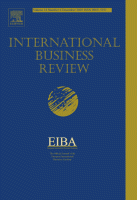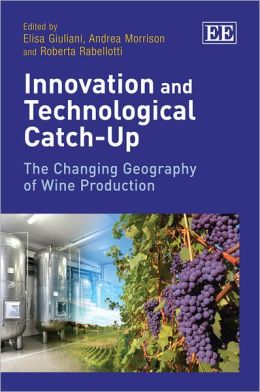Rising Powers Blog
A paper by Rabellotti, together with Giuliani, Gorgoni and Guenther, was reviewed in the Rising Powers Blog.
in Articles, Media Tags: Emerging Countries, Innovation, MNEs
A paper by Rabellotti, together with Giuliani, Gorgoni and Guenther, was reviewed in the Rising Powers Blog.
in Featured Publications, Journal Articles, Publications Tags: Emerging Countries, Innovation, Local Development, MNEs

It empirically investigates how subsidiaries of multinationals from both emerging (EMNEs) and advanced (AMNEs) economies investing in Europe learn from the local context and contribute to it as much as they benefit from it. To explore this we classify the behavior of MNE subsidiaries into different typologies on the basis of how knowledge is transferred within the multinational and on the nature of the local innovative connections. The empirical analysis relies on an entirely new, subsidiary-level dataset in the industrial machinery sector in Italy and Germany. Results show that EMNEs and AMNEs undertake different strategies for tapping into local knowledge and for transferring it within the company. We identify a new typology of EMNE subsidiary that contributes through its significant local innovative efforts to development processes in the host country. This result suggests possible win-win situations from which novel policy implications may be drawn.
The article has been reviewed in the Rising Powers Blog.
in Publications, Working Papers Tags: Catch up, Emerging Countries, Wine industry
International collaboration among researchers is a far from linear and straightforward process. Scientometric studies provide a good way of understanding why and how international research collaboration occurs and what are its costs and benefits. Our study investigates patterns of international scientific collaboration in a specific field: wine related research. We test a gravity model that accounts for geographical, cultural, commercial, technological, structural and institutional differences among a group of Old World (OW) and New World (NW) producers and consumers. Our findings confirm the problems imposed by geographical and technological distance on international research collaboration. Furthermore, it shows that similarity in trade patterns has a positive impact on international scientific collaboration. We find also that international research collaboration is more likely among peers, in other words, among wine producing countries that belong to the same group, e.g. OW producers or newcomers to the wine industry.
in Publications, Working Papers Tags: Catch up, Emerging Countries, Wine industry
The wine industry is an extremely interesting case from a catch up point of view because the latecomers in the international market have changed how wine is produced, sold and consumed and, in doing so, they have challenged the positions of incumbents. Until the end of the 1980s, the European countries, and particularly France and Italy, dominated the international market for wine. Subsequently, significant changes in the market, namely decreases in consumption by traditional consuming countries, the entry of new inexperienced consumers, and the increasing importance of large distribution have threatened this supremacy. Initially, the USA and Australia and later emerging countries such as Chile and South Africa, gained increasing market shares in both exported volumes and value, at the expense of incumbents. However, some of these new-comers (e.g. Australia) have shown slower growth, opening opportunities for newer entrants such as Argentina and New Zealand. At the same time, some of the incumbents (especially Italy) have innovated, which is challenging the leadership of France in key markets such the USA.
In this paper we investigate the different catch up cycles in the global wine sector that have occurred between the 1960s and 2010, through a detailed analysis of export volumes, values and unit prices. We address issues related to the increasing share in the global market of latecomer countries and the relative decline of the incumbents, as well as possible changes in the market leadership within these two groups.
in Publications, Working Papers Tags: Emerging Countries, FDI
In the past century we have witnessed worldwide a growing flow of Foreign Direct Investment (FDI), which have attracted the attention of economists, international business and development scholars. In this scenario, two trends have recently gained momentum: the increasing relevance of Technology- driven FDI (TFDI) and the upsurge of Emerging Economies’ Multinational Enterprises (EMNEs) investing in advanced countries.
In this paper, we present a survey of the relevant literature on TFDI, with a focus on both AMNEs and EMNEs. After presenting the different phases of TFDI from Advanced Economy Multinational Enterprises (AMNEs), we focus on EMNEs and discuss the usefulness and limitations of the existing theoretical frameworks to interpret this new phenomenon. Next, the paper reviews the literature on EMNEs’ sources of competitive advantages and their main motivations for investing abroad. Finally, the paper explores the peculiarities of TFDI from emerging economies.
in Presentations Tags: Catch up, Emerging Countries, Innovation, Wine industry
At the International Symposium on Accelerating Innovation in Developing Countries I talked about innovation in the wine industry.
Download the pdf, Pres UNESCO 2012-11
in Articles, Media Tags: Argentina, Catch up, Chile, Emerging Countries, Innovation, Italy, South Africa, Wine industry
I contributed to the Development Blog with an article on catch up in the wine industry.
in Journal Articles, Publications Tags: Catch up, Chile, Emerging Countries, Innovation, South Africa, Wine industry
Emerging economies are now becoming more central in global competition. To achieve this, many countries have invested to develop into ‘knowledge economies’. Universities have a role to play in this transformation, both as generators of new knowledge as well as actors that can interact with the local industry and contribute to its innovativeness. This paper explores, using two case studies in the Chilean and South African wine industry, how universities connect international science to domestic industry. It finds that this connection occurs through a few ‘bridging researchers’, who display particular characteristics compared with their colleagues. Bridging researchers are more ‘talented’ than average researchers, both because they publish more in international journals and/or because they have received awards for their academic work. This finding may have significant policy implications, as policies aimed at strengthening the skills of these researchers should be welcomed in catching-up industries.
in Articles, Media Tags: Argentina, Catch up, Chile, Emerging Countries, Innovation, Italy, South Africa, Wine industry
The Italian newspaper Sole 24 Ore published an article on my book on Innovation and Catching Up: The changing geography of wine production.
in Presentations Tags: Emerging Countries, Global Value Chain, Innovation

At a Trade Brown Bag Seminar I presented a paper on the relationship between Global Value Chains and Innovation Systems.
Dowload the pdf, Pres World Bank 2011-07
in Presentations Tags: Emerging Countries, Global Value Chain, Innovation
At the Competitiveness Day in San Sebastian I discussed the relationship between innovation systems and the global value chains.
Download the pdf, Pres ORKESTRA 2011-07
in Books, Publications Tags: Argentina, Catch up, Chile, Emerging Countries, Innovation, Italy, South Africa, Wine industry

Since the beginning of the 1990s, the supremacy of ‘Old World’ countries (France and Italy) in the international wine market has been challenged by new players, such as Australia, Argentina, Chile and South Africa, which are recording stunning performances in terms both of export volume and value. This book demonstrates that such a spectacular example of catch-up goes beyond simply copying new technologies; it entails creative adaptation and innovation, and introduces a new growth trajectory in which consistent investments in research and science play a key role.
«This book overturns the old paradigm ideas about natural-resource-based activities. It sheds light on the new opportunities for technological dynamism and catching-up by using science to open novel directions in traditional sectors. It should become a classic in what I expect will be a very important academic debate and a new trend in development policy.»
Carlota Perez
Tallinn University of Technology, Estonia; Cambridge University and University of Sussex, UK
«This excellent book demonstrates better than any other I know the strengths and limits of the concept of a national system of innovation for understanding economic development today. Any careful student of innovation or development will want to read it.»
Charles Sabel
Columbia Law School, USA
Here you can read the introduction,
The Changing Geography of Wine Production_Intro
Here you can read some reviews of the book,
regional studies,
AAG Review of Books,
Journal of Wine economics,
agriregionieuropa_n28,
Il Sole 24 Ore
You can buy the book here.